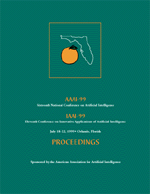Proceedings:
Proceedings of the AAAI Conference on Artificial Intelligence, 16
Volume
Issue:
Proceedings of the AAAI Conference on Artificial Intelligence, 16
Track:
Learning
Downloads:
Abstract:
Consider the problem of monitoring the state of a complex dynamic system, and predicting its future evolution. Exact algorithms for this task typically maintain a belief state -- the distribution over the states at some point in time. Unfortunately, these algorithms fail when applied to complex processes such as those represented as dynamic Bayesian networks (DBNs), as the representation of the belief state grows exponentially with the size of the process. Boyen and Koller recently proposed an efficient approximate tracking algorithm that maintains an approximate belief state that has a compact representation as a set of independent factors. Their analysis relies on a bound on the error introduced by approximating a belief state of this process by a factored one. They argue informally that their algorithm is justified in cases where the interaction between variables in the processes is "weak." In this paper, we give formal information-theoretic definitions for notions such as weak interaction and sparse interaction of processes. We use these notions to analyze the conditions under which the error induced by this type of approximation is small. We demonstrate several cases where our results formally support intuitions about strength of interaction.

AAAI
Proceedings of the AAAI Conference on Artificial Intelligence, 16
ISBN 978-0-262-51106-3
July 18-22, 1999, Orlando, Florida. Published by The AAAI Press, Menlo Park, California.
